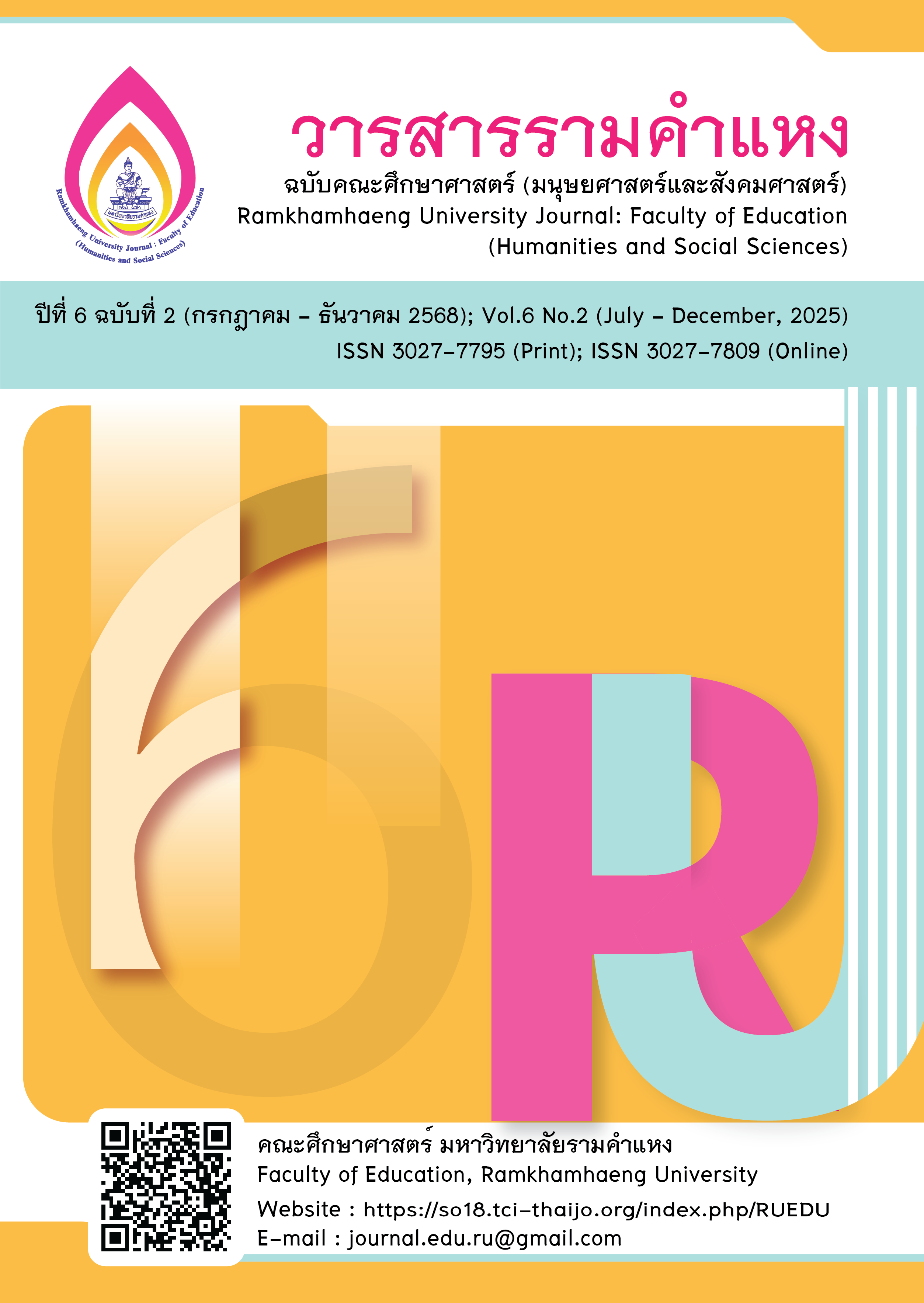ผลของโปรแกรมการปรึกษาออนไลน์รายบุคคลเชิงบูรณาการตามทฤษฎีเล่าเรื่องและการอบรม เชิงจิตวิทยาต่อการนิยมความสมบูรณ์แบบของพนักงานกลุ่มเจเนอเรชันวาย บริษัทเอกชนในเขตกรุงเทพมหานคร
Main Article Content
บทคัดย่อ
การวิจัยครั้งนี้ มีวัตถุประสงค์เพื่อศึกษาผลของโปรแกรมการปรึกษาออนไลน์รายบุคคลเชิงบูรณาการตามทฤษฎีเล่าเรื่องและการอบรมเชิงจิตวิทยาต่อการนิยมความสมบูรณ์แบบของพนักงานบริษัทในกลุ่มเจเนอเรชันวาย กลุ่มตัวอย่างที่ใช้ในการศึกษาเป็นพนักงานประจำบริษัท ในเขตกรุงเทพมหานคร อายุระหว่าง 27-42 ปี ที่มีคะแนนเฉลี่ยการนิยมสมบูรณ์แบบสูงกว่าเกณฑ์ จำนวน 20 คน การทดลองครั้งนี้จึงมีกลุ่มทดลองจำนวน 10 คน ซึ่งได้รับโปรแกรมการปรึกษาออนไลน์รายบุคคลเชิงบูรณาการตามทฤษฎีเล่าเรื่องและการอบรมเชิงจิตวิทยา กลุ่มควบคุมมีจำนวน 10 คน ไม่ได้รับโปรแกรมการปรึกษาออนไลน์รายบุคคลเชิงบูรณาการตามทฤษฎีเล่าเรื่องและการอบรมเชิงจิตวิทยา เครื่องมือที่ใช้ในการวิจัย ได้แก่ แบบวัดการนิยมความสมบูรณ์แบบและโปรแกรมการปรึกษาออนไลน์รายบุคคลเชิงบูรณาการตามทฤษฎีเล่าเรื่องและการอบรมเชิงจิตวิทยาต่อการนิยมความสมบูรณ์แบบ แบบวัดการนิยมความสมบูรณ์แบบจะวัด 3 ระยะ คือ ระยะก่อนการทดลอง ระยะทดลอง และระยะติดตาม ผลการศึกษาพบว่า กลุ่มทดลองมีคะแนนค่าเฉลี่ยการนิยมความสมบูรณ์แบบในระยะหลังการทดลองและระยะติดตามผลต่ำกว่าก่อนทดลองอย่างมีนัยสำคัญทางสถิติที่ระดับ .05 และมีคะแนนค่าเฉลี่ยการนิยมความสมบูรณ์แบบในระยะหลังการทดลองและระยะติดตามผลต่ำกว่ากลุ่มควบคุมอย่างมีนัยสำคัญทางสถิติที่ระดับ.05 ดังนั้น การปรึกษาออนไลน์รายบุคคลเชิงบูรณาการตามทฤษฎีเล่าเรื่องและการอบรมเชิงจิตวิทยาต่อการนิยมความสมบูรณ์แบบของพนักงานบริษัทในกลุ่มเจเนอเรชันวาย สามารถช่วยลดลักษณะการนิยมความสมบูรณ์แบบได้อย่างมีประสิทธิภาพ
Downloads
Article Details

อนุญาตภายใต้เงื่อนไข Creative Commons Attribution-NonCommercial-NoDerivatives 4.0 International License.
ผู้ส่งบทความ (และคณะผู้วิจัยทุกคน) ตระหนักและปฎิบัติตามจริยธรรมการวิจัยอย่างเคร่งครัด ทั้งนี้บทความ เนื้อหา ข้อมูล ข้อความ ภาพ ตาราง แผนภาพ แผนผัง หรือข้อคิดเห็นใดๆ ที่ปรากฎในบทความ เป็นความคิดเห็นและความรับผิดชอบของผู้ส่งบทความ กองบรรณาธิการไม่จำเป็นต้องเห็นตามเสมอไป และไม่มีส่วนรับผิดชอบใดๆ โดยถือเป็นความรับผิดของของเจ้าของบทความเพียงผู้เดียว
เอกสารอ้างอิง
Afrasiabi, D. (2020). The effectiveness of the narrative therapy on the fear of negative/positive evaluation and social phobia symptoms in socially anxious female students. Psychiatria, 17(4), 181-185.
Beheshtifar, M., Mazrae-Sefidi, F., & Nekoie Moghadam, M. (2011). Role of perfectionism at workplace. European Journal of Economics, Finance and Administrative Sciences, 38, 167-173.
Birrer, D., & Morgan, G. (2010). Psychological skills training as a way to enhance an athlete's performance in high‐intensity sports. Scandinavian journal of medicine & science in sports, 20, 78-87.
Brand Inside. (2020). Did you know? 7 out of 10 Bangkokians experience burnout: Research reveals which businesses can meet their needs. Brand Inside. https://brandinside.asia/burnout-in-the-city/ (in Thai)
Carr, A. (1998). Michael White's narrative therapy. Contemporary Family Therapy, 20, 485-503.
Chueaphun, P. (2018, October 18). Health problems of Millennials. Samitivej Hospital. https://www.samitivejhospitals.com/th/article/detail/สุขภาพ-millennials (in Thai)
Cronbach, L. J. (1990). Essentials of psychological testing (5th ed). Harper & Row.
Curran, T., & Hill, A. P. (2019). Perfectionism is increasing over time: A meta-analysis of birth cohort differences from 1989 to 2016. Psychological Bulletin, 145(4), 410-429.
DeKruyf, L. (2008). An Introduction to Narrative Therapy. In Jordan K. (Ed.), The quick theory reference guide: A resource for expert and novice mental health professionals (pp. 445–460). Nova Science Publishers.
Dong-gwi, L., Ha-rim, S. & Seo-young, K. (2024). Four perfectionists. (N. Suwannachot, Trans.). Amarin Printing & Publishing . (Original work published 2021) (in Thai)
Fang, T., & Liu, F. (2022). A Review on Perfectionism. Open Journal of Social Sciences, 10(1), 355-364.
Frost, R. O., Marten, P., Lahart, C., & Rosenblate, R. (1990). The dimensions of perfectionism. Cognitive Therapy and Research, 14, 449-468.
Ghavibazou, E., Hosseinian, S., & Abdollahi, A. (2020). Effectiveness of narrative therapy on communication patterns for women experiencing low marital satisfaction. Australian and New Zealand Journal of Family Therapy, 41(2), 195-207.
Howell, D. C. (2007). Statistical methods for psychology (6th ed.). Dexbury Press.
Johanna, S. (2002). Applications of Narrative Theory and Therapy to the Practice of Family Medicine. Family Medicine, 34(2), 96-100.
Juito, S. (2011). Systematic training: A new learning theory approach. Textbook Promotion Project, Academic Division, Sukhothai Thammathirat Open University. (in Thai)
Katamat, W. (2022, November 30). Perfectionist Everything in life must not go wrong, but may break your heart without realizing it. Bangkok Business News. https://www.bangkokbiznews.com/health/well-being/1040740 (in Thai)
Kulnapadol, P. (2022). Family Counseling (4th ed.). Department of Research and Applied Psychology, Faculty of Education, Burapha University. (in Thai)
Milne, A. (2003). Teach yourself counseling. Cox & Wyman Morganett.
Ninsira, S. (2022, December 9). Gen Y Why always me? : 8 problems that Gen Y must face in this era. https://www.agenda.co.th/lifestyle/fun/genmillennials/ (in Thai)
Øverup, C. S., Brunson, J. A., Steers, M.-L. N., & Acitelli, L. K. (2017). I Know I have to earn your love: how the family environment shapes feelings of worthiness of love. International Journal of Adolescence and Youth, 22(1), 16-35. doi:10.1080/02673843.2013.868362
Phothisa, S. (2023, February 7). Revealing the numbers of Thai people of each generation, an important variable in the 2023 election. Thai TBS. https://www.thaipbs.or.th/now/content/61 (in Thai)
Privitera, G. J. (2015). Statistics for the behavioral sciences (2nd ed.). Sage Publications.
Rinthaisong, I. (2014). Determining the Content Validity Index (CVI). Faculty of Management Sciences, Prince of Songkla University. (in Thai)
Rozental, A. (2020). Beyond perfect? A case illustration of working with perfectionism using cognitive behavior therapy. Journal of Clinical Psychology, 76(11), 1-14.
Shafran, R., & Mansell, W. (2001). Perfectionism and psychopathology: A review of research and treatment. Clinical Psychology Review, 21(6), 879-906.
Shafran, R., Cooper, Z., & Fairburn, C. G. (2002). Clinical perfectionism: a cognitive-behavioural analysis. Behaviour research and therapy, 40(7), 773–791.
Stoeber, J. (2014). Perfectionism. In R. C. Eklund & G. Tenenbaum (Eds.). Encyclopedia of sport and exercise psychology (Vol. 2, pp. 527-530). Sage Publications.
Watthanaprom, B. (2010). A Study and Development Self-Acceptance Program of Prisoners by The Iddhipata4. [Master thesis, Srinakharinwirot University]. http://thesis.swu.ac.th/swuthesis/Gui_Cou_Psy/PhraBuntherm_W.pdf (in Thai)
White, M. (2007). Maps of Narrative Practice. WW Norton & Company
Yahghoubi, H., & Mohammadzadeh, A. (2015). Comparison of perfectionism and related positive-negative dimension in people with high traits on obsessive compulsive and eating disorder characteristics. Iranian Journal of Psychiatry and Behavioral Sciences, 9(3), 1-5.
Yoomimai, R. & Thaithani, P. (2020). The Effects of Psychological Training on Goal Setting to Learn of Secondary Education Grade 3 Students. Ratchaphruek Journal, 18(1), 74-82. (in Thai)


